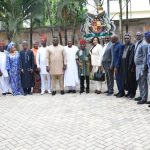CBN MPC Holds Key Policy Rates, Cites Mixed Outlook for Inflation and Fiscal Receipts
By Patience Ikpeme
The Monetary Policy Committee (MPC) of the Central Bank of Nigeria (CBN) has resolved to maintain its key monetary policy instruments unchanged, following a thorough assessment of both domestic and global economic conditions.
The decision, which was taken unanimously by members of the Committee, was announced at the conclusion of its latest policy meeting held in Abuja.
According to the MPC, the Monetary Policy Rate (MPR) will remain at 27.50 percent, while the asymmetric corridor around the MPR is retained at +500/-100 basis points. The Cash Reserve Ratio (CRR) stays at 50.00 percent for Deposit Money Banks and 16.00 percent for Merchant Banks. The Liquidity Ratio is also held steady at 30.00 percent.
Addressing journalists after the meeting, CBN Governor Mr Olayemi Cardoso said “the Committee noted relative improvements in several key macroeconomic indicators which are expected to support the moderation of prices in the short to medium term.”
Notably, there has been a progressive narrowing of the gap between the official Nigeria Foreign Exchange Market (NFEM) and the Bureau De Change (BDC) windows. Other positive developments include a favourable balance of payments position and a recent decline in the price of Premium Motor Spirit (PMS).
However, the MPC Cardoso said “observed that inflationary pressures remain strong, driven in large part by high electricity tariffs, sustained foreign exchange demand, and long-standing structural challenges.” In response, the Federal Government has introduced new policy initiatives aimed at stimulating local production and reducing demand for foreign currency. These measures are intended to limit the impact of exchange rate pass-through on domestic prices.
Despite the promising signs on the inflation front, the Committee expressed concern over recent external developments that could adversely affect Nigeria’s fiscal position. Specifically, it pointed to the ongoing fall in international crude oil prices, which it attributes to increased output from non-OPEC producers. Additionally, uncertainties surrounding trade policy in the United States were cited as potential headwinds to fiscal revenue and the effective implementation of the federal budget.
On the banking sector, the MPC noted the sustained stability of the financial system, pointing to improvements in key performance indicators. The Committee also acknowledged steady progress in the ongoing bank recapitalization programme, which is aimed at strengthening the resilience of the banking sector to withstand macroeconomic shocks.
After weighing the available policy options, the Committee concluded that holding all policy parameters unchanged was the most prudent course of action under the current circumstances. This approach, members agreed, allows for continued observation and assessment of evolving domestic and international economic conditions.
The MPC’s decision reflects a cautious posture in the face of ongoing global uncertainties and a complex domestic economic environment. With inflation still a major concern and fiscal receipts potentially under pressure from falling oil prices, the CBN has opted to stay the course while monitoring the impact of recent government reforms and global trends.
The next meeting of the MPC is expected to provide further insights into the trajectory of monetary policy in Nigeria, as both the central bank and fiscal authorities seek to navigate the economy through current challenges toward sustainable growth and price stability.




